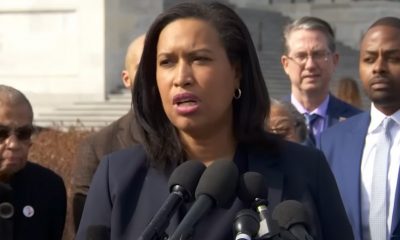District of Columbia
Apparent overdose deaths of two beloved D.C. gay men trigger ‘powerful response’
LGBTQ bars to offer training, distribution of Narcan, fentanyl testing kits
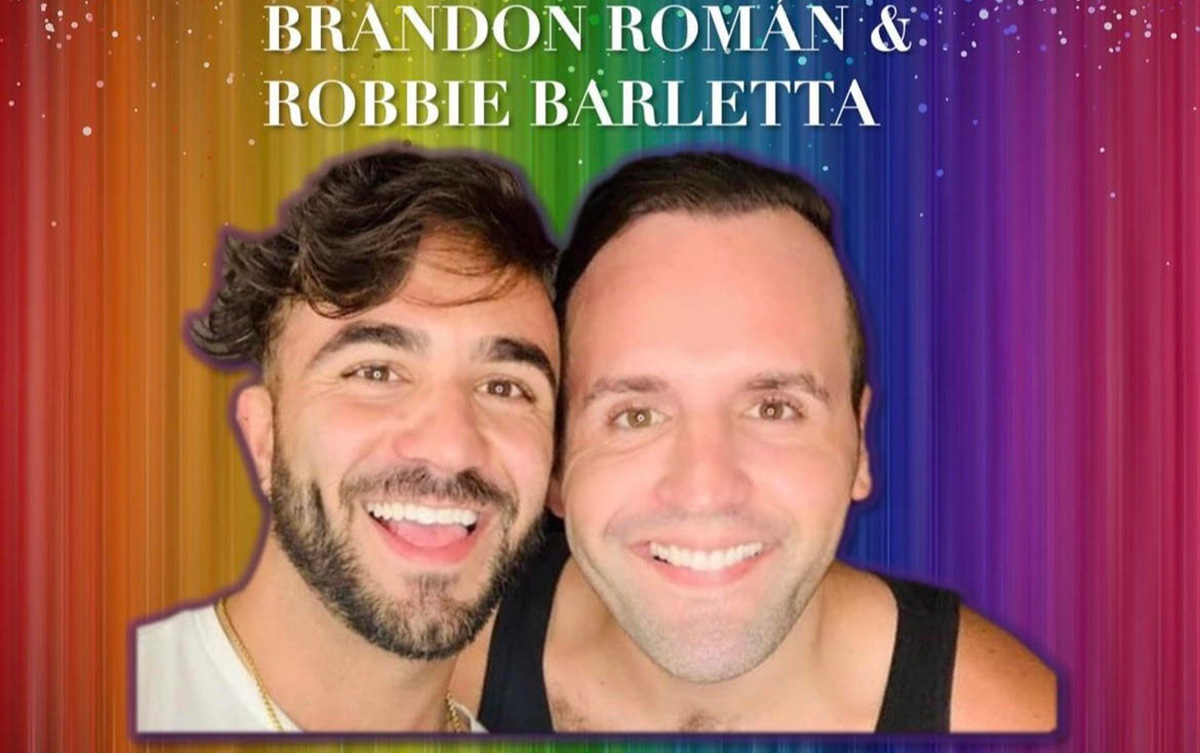
Sources familiar with D.C.’s LGBTQ nightlife scene say widespread reports on social media of the sudden and unexpected deaths of two widely known and beloved gay men from an apparent accidental drug overdose on Dec. 27 at one of the men’s homes has triggered an outcry for the city and the community to become more aggressive in addressing the opioid overdose problem and how it is impacting the LGBTQ community.
D.C. police and Fire and Emergency Medical Services Department reports show that prominent D.C. attorney and LGBTQ rights supporter Brandon Roman, 38, and historic preservation expert and home renovation business owner Robert ‘Robbie’ Barletta, 28, were found unconscious when police and emergency medical personnel arrived at Barletta’s house on the afternoon of Dec. 27.
The reports show that Roman was declared deceased at the scene shortly after D.C. police and an ambulance arrived at the house in response to a 911 call. According to one of the reports, Barletta was taken to Washington Hospital Center where he died on Dec. 29.
Both men were regular patrons at popular D.C. gay bars, including the gay nightclub and dance bar Bunker and the recently opened gay bar and lounge Shakers.
“Come to Honor their Lives in Your Best Sparkles and Shimmers – Saturday, February 3rd 5-8pm at Shakers,” according to an announcement by Shakers posted on Instagram of a celebration of life for Roman and Barletta.
Johnny Bailey, community outreach coordinator for the LGBTQ supportive community services organization HIPS, said the widespread news of Roman and Barletta’s passing has prompted more interest and support for the overdose training sessions that HIPS and other groups have been organizing at D.C. nightlife venues, including bars and nightclubs.
Bailey noted that one of the training sessions is scheduled for Saturday, Jan. 27 at the D.C. gay bar Trade. He said the next one was scheduled for Monday, Jan. 29 at the Adams Morgan gay bar Pitchers. Among other things, facilitators at the trainings will be distributing the life-saving overdose antidote Narcan and testing kits for fentanyl, which experts say is the leading cause of drug overdose deaths when it appears in other drugs such as cocaine without the knowledge of users of those other drugs.
According to Bailey, the gay bar JR.’s on 17th Street near Dupont Circle has hosted a table set up by HIPS to distribute Narcan, fentanyl test strips, and condoms on nights when the bar holds its popular drag shows.
Bailey said he did not know Roman and Barletta personally but people he works with at HIPS knew them and, according to his sources in the community, people who knew the two men believe their apparent overdose was caused by taking some other drug contaminated with fentanyl.
“It’s horrible when it takes a tragedy for things to come together,” Bailey told the Washington Blade. “But this tragedy has truly triggered a powerful response. It was a real wakeup call to a lot of people,” he said. “So, this happening to them really triggered something.”
Among other things, Bailey said, it has heightened interest in the training sessions at bars and other nightlife venues and prompted HIPS and other organizations to increase the number of the trainings.
David Perruzza, owner of Pitchers, said he was happy to host the training session at his bar on Jan. 29. He said he was among the business owners and community members to urge D.C. Mayor Muriel Bowser’s Office of LGBTQ Affairs to become involved in boosting overdose prevention efforts “because I was sick of people dying.”
Bailey and Jennifer Loken, interim director of Therapy and Substance Use Treatment at D.C.’s Whitman-Walker Health, each said it was difficult to determine exactly how many LGBTQ people in the city have survived or died from a drug overdose because the city doesn’t specifically count or keep track of overdose cases based on a person’s sexual orientation or gender identity.
The D.C. Office of the Chief Medical Examiner, which investigates and gathers data on D.C. drug overdose cases, breaks down its demographic data by race-ethnicity, gender, age, and jurisdiction of residence by city ward. In its most recent report, the medical examiner’s office says it has investigated 2,134 deaths due to the use of opioids from Jan. 1, 2017, through Feb. 28, 2023. In those years, the number of overdose deaths increased each year except for 2018, when there was a small decrease, followed by an increase in 2019 with a sharp increase in 2022 and 2023.
In 2022, the most recent year in which the full year data was tabulated, the report says there were 458 overdose deaths, with an average of 38 deaths per month.
“Overall, 1,807 or 84 percent of all deaths due to opioid use were among Blacks” from January 2017 through May 2023, the report says. “Approximately 72 percent of all fatal opioid overdoses occur among adults between the ages of 40-69 years old,” with 30 percent of those deaths due to opioid use among people ages 50 to 59, the report states. And the report shows that fatal opioid overdoses are far more common among males than females. In 2023, 76 percent of the overdose deaths were among men and 24 percent among women, the report shows.
Asked if Whitman-Walker has a sense or estimate of whether LGBTQ overdose cases are increasing like they are in the overall D.C. population, Loken said, “I would say yes from what I hear anecdotally. Any overdose death is a significant loss.” She added, “So, I think in general, yes, the risk is increasing. Exactly to what degree I don’t know.”
Rodney Adams, general counsel and spokesperson for the Office of the Chief Medical Examiner, said it would be difficult for the office to attempt to keep track of overdose deaths based on a person’s sexual orientation or gender identity for transgender people. Among other things, the sexual orientation or gender identity of a deceased person taken to the medical examiner’s facility for an autopsy and toxicology tests to determine the cause and manner of death would be difficult to determine, Adams said.
“I don’t think we can go out and question the next of kin of what they think their loved one identified as,” Adams told the Blade. “We have a difficult enough conversation with families when we tell them that their loved one is deceased.”
Loken of Whitman-Walker said Whitman-Walker has several programs and services for those who use drugs, including providing medication to help people who may want to stop using an opioid drug as well as harm reduction programs to help someone who wishes to continue using a drug to do so in the safest possible way.
“Sometimes there’s a lot of stigma around substance use in general,” Loken said. “And we definitely don’t want anyone to feel shameful or that they can’t ask for what they need.” All of Whitman-Walker’s substance use treatment or support programs are nonjudgmental toward those who are substance users, Loken told the Blade.
Bailey said one potential problem HIPS has encountered in organizing overdose training sessions at bars and other nightlife businesses is some of the businesses declined to host a training session because they were concerned the city’s Alcoholic Beverage and Cannabis Administration (ABCA), which regulates the sale of alcoholic beverages in the city, might penalize them for appearing to encourage drug use. Bailey said owners at some bars said they were afraid ABCA might take steps to revoke their liquor license if they hosted an overdose training session in which Narcan and drug testing kits were distributed
Jarred Powell, ABCA’s chief of staff, in response to an inquiry from the Blade, said ABCA would not penalize businesses for hosting such a training.
“ABCA is strongly supportive of alcohol licensed businesses encouraging their staff to become trained in opioid overdose prevention and naloxone administration and for businesses to have naloxone on hand to administer if any opioid overdose occurs,” Powell said in a statement to the Blade. Naloxone is the generic name for the overdose treatment medication Narcan.
“Additionally, ABCA supports businesses posting and distributing overdose prevention and treatment resources such as posters and brochures,” Powell said. “All are critically important components to D.C.’s harm reduction approach to substance abuse.”
Powell said ABCA is also collaborating with the D.C. Department of Behavioral Health, which oversees the city’s overdose prevention programs, and the Mayor’s Office of Nightlife and Culture and Office of LGBTQ Affairs to increase the city’s overdose prevention initiatives and to co-host Narcan administration trainings.
Japer Bowles, director of the Mayor’s Office of LGBTQ Affairs, issued an announcement on Dec. 31 praising HIPS, the city’s Department of Behavioral Health, and the LGBTQ supportive Capital Ballroom Council for making sure “every LGBTQIA nightlife establishment in D.C.” had Narcan in time for their New Year’s Eve celebrations.
Bailey, meanwhile, said he and other HIPS staff members will continue the work they started in the recent past to organize overdose prevention trainings.
“We go anywhere in the community,” he said. “I’ve done libraries, bars. I did a church one day and the Sisters of Perpetual Indulgence the next day,” he said, referring to the group that performs in drag dressed as nuns. “Any and all sorts of places we do these Narcan trainings.”
District of Columbia
Little Gay Pub to host April 25 celebration of life for Patrick Shaw
School teacher, D.C. resident praised for ‘warmth, humor, kindness’
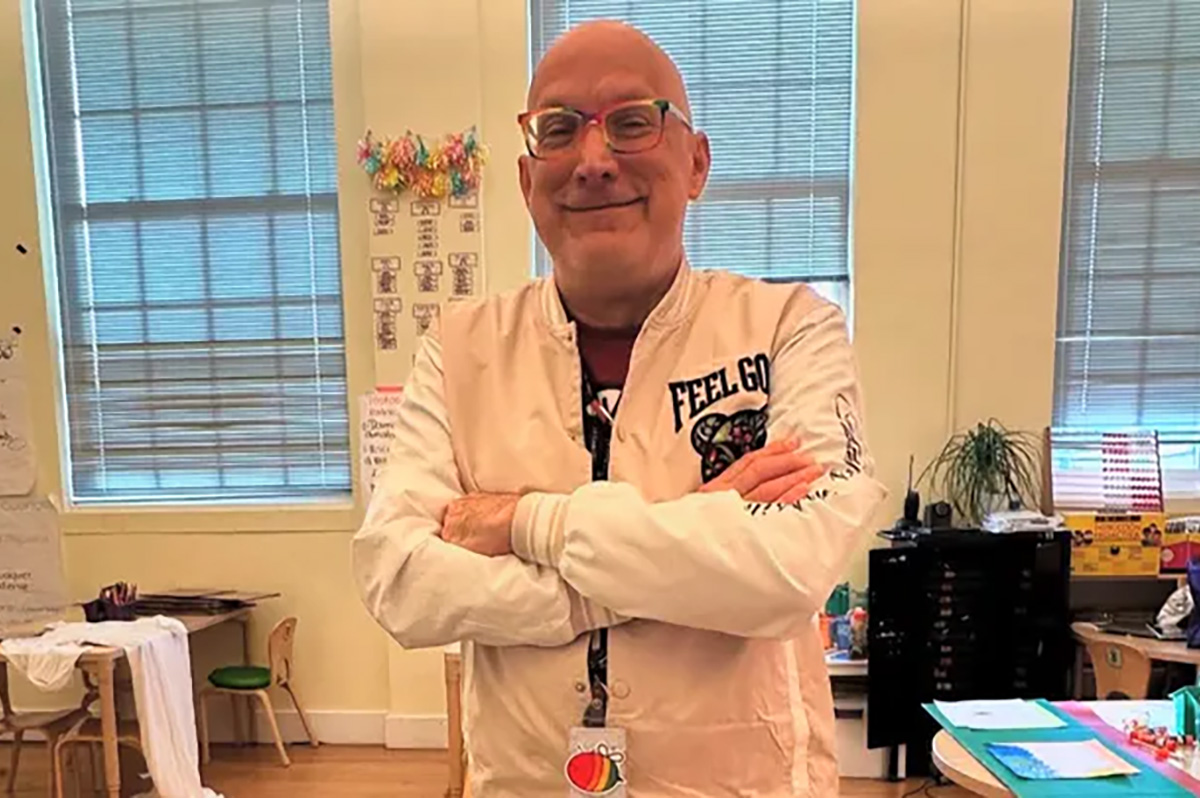
Co-workers and friends will hold a celebration of life for highly acclaimed schoolteacher and D.C. resident Patrick Shaw beginning at 5:30 p.m. Friday, April 25 at The Little Gay Pub 1100 P St., N.W.
Little Gay Pub co-owner and Shaw’s friend, Dusty Martinez, said Shaw passed away unexpectedly on April 19 from a heart related ailment at the age of 60.
“Patrick touched so many lives with his warmth, humor, kindness, and unmistakable spark,” Martinez said. “He was a truly special soul – funny, vibrant, sassy, and full of life and we are heartbroken by his loss.”
In an Instagram posting, Shaw’s colleagues said Shaw was a second-grade special education teacher at the J.F. Cook campus of D.C.’s Mundo Verde Bilingual Public Charter School.
“Patrick brought warmth, joy, and deep commitment to Mundo Verde,” his colleagues said in their posting. “His daily Broadway sing-alongs, vibrant outfits, and genuine love for his students filled our community with energy and laughter.”
The posted message adds, “Patrick was more than a teacher; he was a light in our school, inspiring us all to show up with heart, humor, and kindness every day. His spirit will be deeply missed.”
The Washington Blade is preparing a full obituary on Patrick Shaw to be published soon.
District of Columbia
D.C. police seek help in identifying suspect in anti-gay threats case
Victim threatened with assault, called ‘faggot’ as he left Capitals game
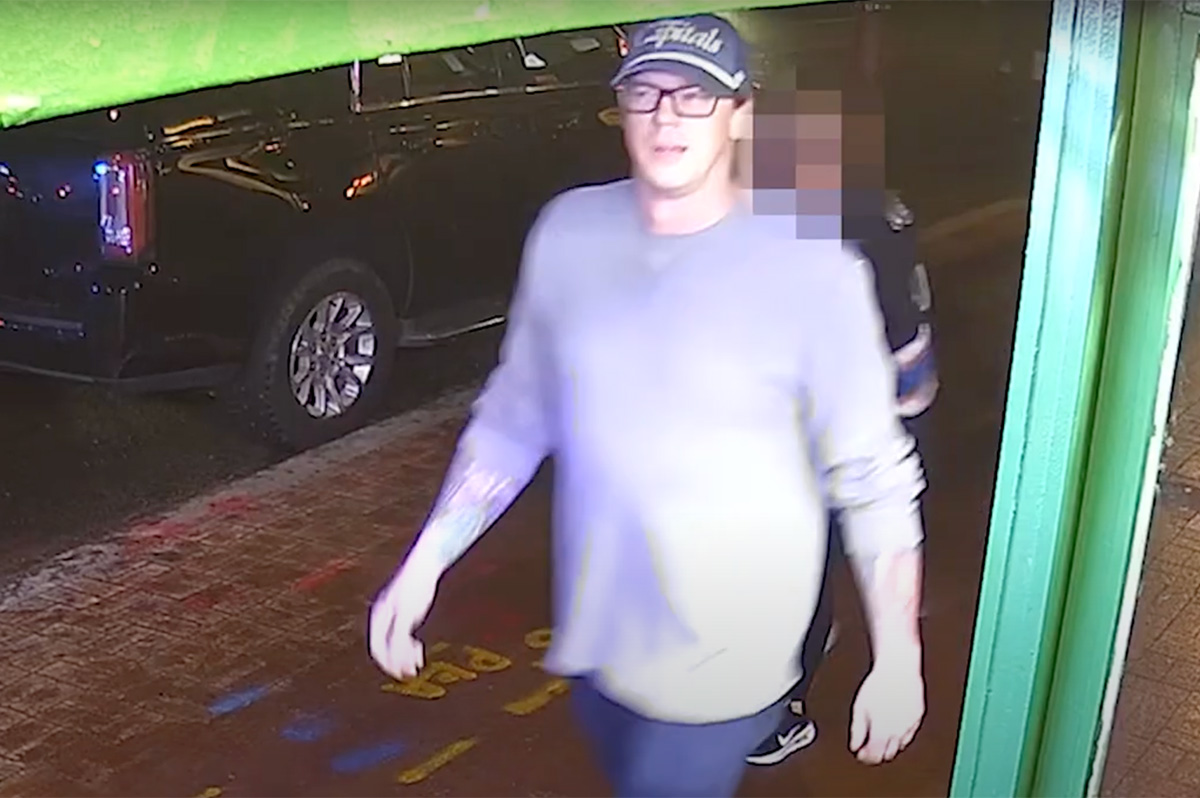
D.C. police are seeking help from the public in identifying a male suspect whose image was captured by a video surveillance camera after he allegedly shouted anti-gay slurs and threatened to assault a man at 6th and H Streets, N.W. on March 20 at about 9:54 p.m.
A police report says the victim told police the incident took place shortly after he exited the nearby Capital One Arena where he had attended a Washington Capitals hockey game.
The police report says the incident began when the victim saw the suspect yell a racist slur at a person behind the victim and started to berate a valet operator.
“Suspect 1 then turned his attention to Victim 1 and called him a ‘faggot’ among other homophobic slurs,” the report says. It says the victim then used his phone to record the suspect, prompting the suspect to walk away before returning and “snatching” the phone from the victim’s hand.
“Suspect 1 walked several feet as Victim 1 followed, requesting his phone back,” the report continues. “Suspect 1 stopped and turned to Victim 1 and while yelling other obscenities exclaimed ‘if you keep recording, I’m going to kick your ass.’” The report concludes by saying the victim was able to recover his phone.
It lists the incident as a “Threats To Do Bodily Harm” offense that is a suspected hate crime.
“Anyone who can identify this suspect or has knowledge of this incident should take no action but call police at 202-727-9099, or text your tip to the Department’s TEXT TIP LINE at 50411,” according to a separate police statement released April 23.
The statement says police currently offer an award of up to $1,000 to anyone who can provide information that leads to an arrest and indictment of the person or persons responsible for a crime committed in D.C.
D.C. police spokesperson Tom Lynch said the case has been under investigation since the incident occurred on March 20. He said the video image of the suspect, most likely obtained from a security camera from a nearby business, was released to the public as soon as it was obtained and processed through the investigation.
District of Columbia
Wanda Alston Foundation names new executive director
Longtime LGBTQ rights advocate Cesar Toledo to succeed June Crenshaw
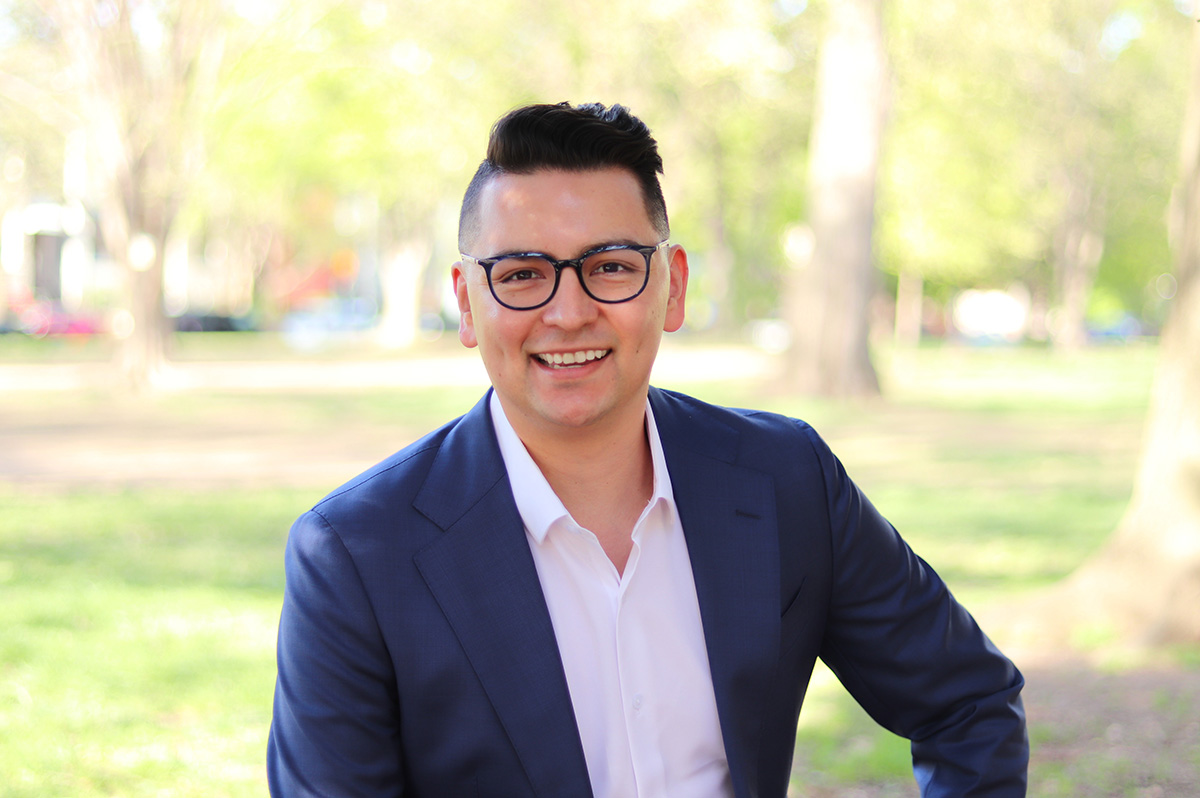
The Wanda Alston Foundation, the D.C.-based organization that has provided housing and support services for homeless LGBTQ youth since its founding in 2008, announced it has appointed longtime LGBTQ rights advocate Cesar Toledo as its new executive director.
In an April 22 statement, the organization said that as part of a planned leadership transition launched in November 2024, Toledo will succeed June Crenshaw, who Alston Foundation officials and LGBTQ community activists say has led the organization with distinction in her role as executive director for the past nine years.
In a statement released last November, the foundation announced Crenshaw was stepping down from her role as executive director after deciding to “to step into her next chapter.”
“June’s leadership has been truly transformative,” said Alston Foundation Board Chair Darrin Glymph in the group’s April 22 statement. “We are immensely grateful for her dedication and equally excited for the energy and experience that Cesar brings to lead us into this next chapter,” Glymph said.
“A seasoned LGBTQ+ advocate, Cesar brings over a decade of experience leading national campaigns, shaping public policy, and building inclusive communities,” the statement released by the group says. “Most recently, he served as the National LGBTQ+ Engagement Director for the Harris for President Campaign and has built a career focused on advancing equality and equitable education,” it says.
Biographical information about Toledo shows that immediately prior to working for the Harris For President Campaign, he served since April 2023 as deputy director for Democrats for Education Reform DC (DFER DC), a political group that helps to elect candidates for public office committed to quality education for all students, including minorities, people of color and LGBTQ youth.
Before joining DFER DC, Toledo served as political director for the LGBTQ+ Victory Fund, where he assisted in electing out LGBTQ candidates to all levels of public office across the U.S.
“I’m really excited about joining the Wanda Alston Foundation,” Toledo told the Washington Blade. “After a decade of working at the intersection of politics and policy and advancing political candidates and equitable education here in D.C., I wanted to shift my career to direct services to the most vulnerable folks in the LGBTQ+ family and our homeless youth,” he said.
Among other things, he said he would push for increasing the Alston Foundation’s visibility and mainlining its services for LGBTQ youth at a time when the national political climate has become less supportive.
A statement on its website says the Alston Foundation was founded in 2008 “in memory of Wanda Alston, a fierce LGBTQ+ activist, national advocate, and government official who was admired by District residents.”
The statement adds, “The foundation opened the first housing program in the nation’s capital in 2008 providing pre-independent transitional living and life-saving support services to LGBTQ+ youth.”
In a separate statement, the Alston Foundation announced it would hold a “thank you” celebration of appreciation for June Crenshaw from 6-8 p.m. on May 20 at Crush Dance Bar located at 2007 14th Street, N.W. in D.C.
“Let’s come together to celebrate her dedication and commitment for everything she has done for the LGBTQIA homeless youth population,” the statement says.
-

 Federal Government4 days ago
Federal Government4 days agoHHS to retire 988 crisis lifeline for LGBTQ youth
-

 Opinions4 days ago
Opinions4 days agoDavid Hogg’s arrogant, self-indulgent stunt
-

 District of Columbia4 days ago
District of Columbia4 days agoD.C. police seek help in identifying suspect in anti-gay threats case
-

 Virginia4 days ago
Virginia4 days agoGay talk show host wins GOP nom for Va. lieutenant guv





